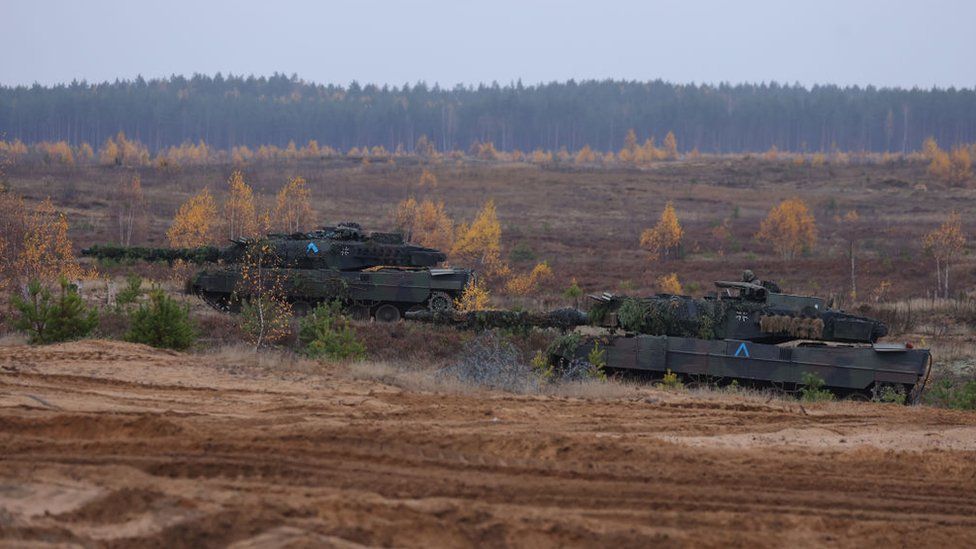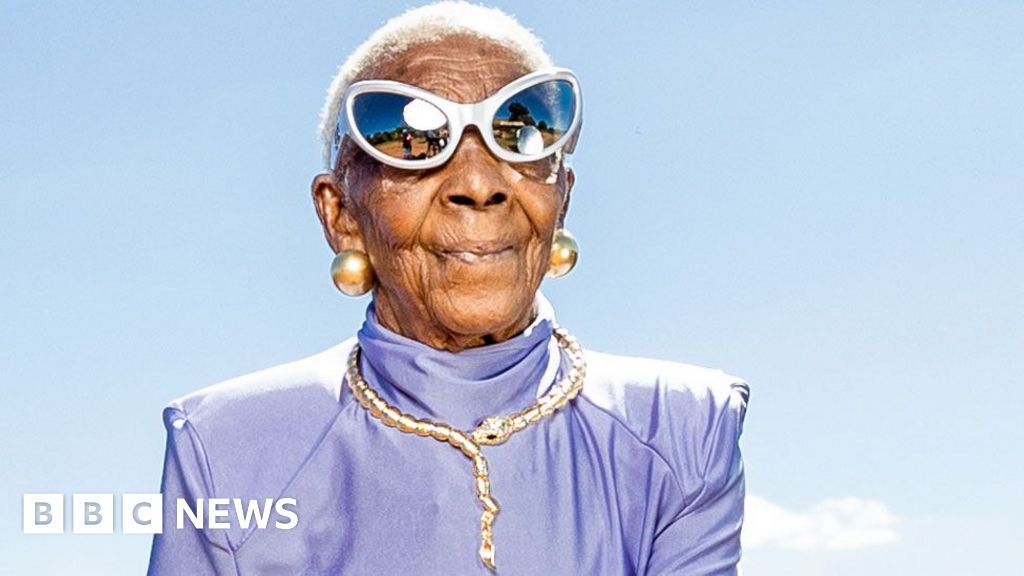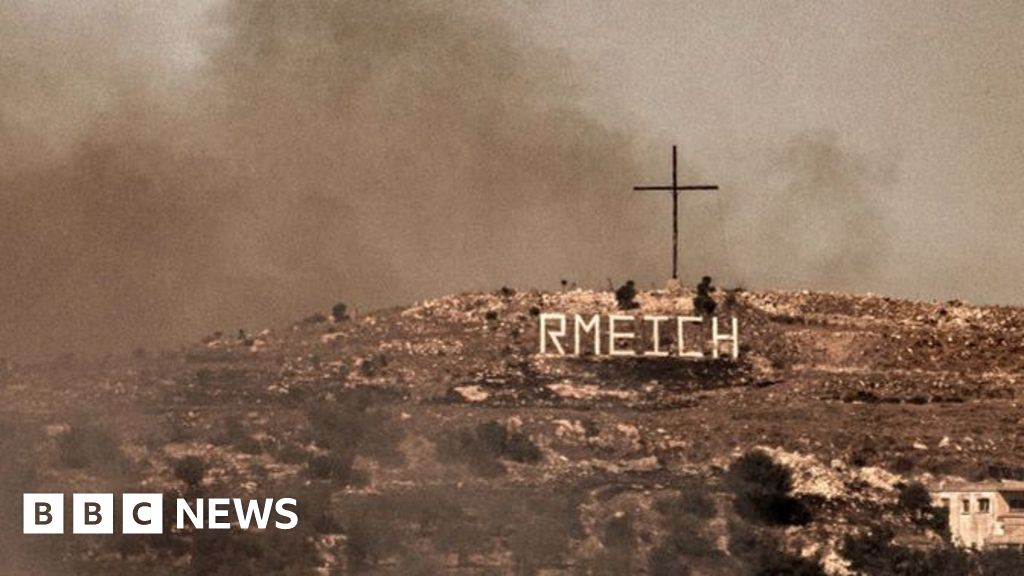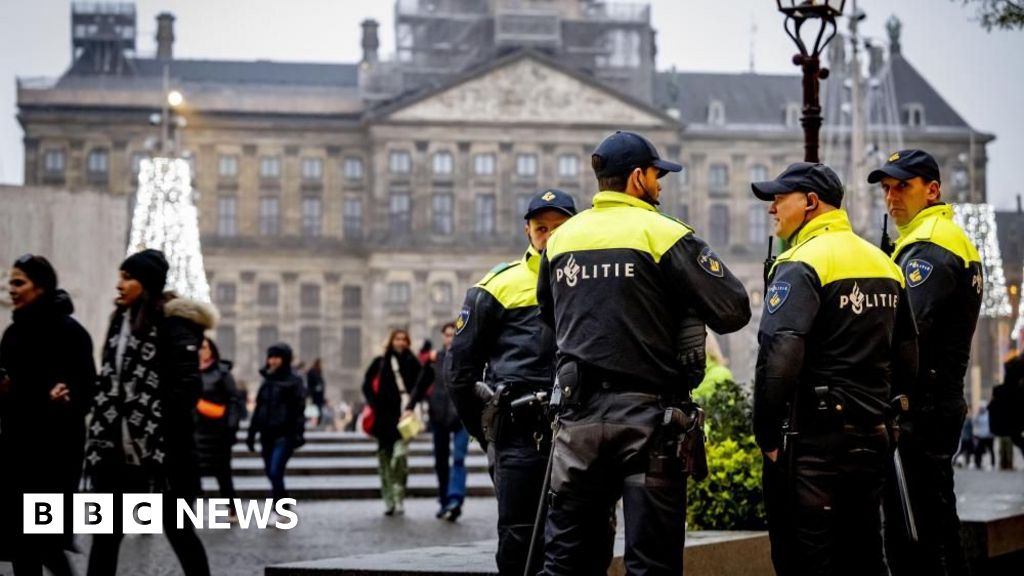ARTICLE AD BOX
 Image source, Getty Images
Image source, Getty Images
German Leopard 2 tanks during a military exercise in Lithuania in October
Germany will only send battle tanks to Ukraine if the US does the same, multiple reports suggest.
Chancellor Olaf Scholz is under increasing international and domestic pressure to supply German-built Leopard 2 tanks or at least approve their delivery by third countries.
Poland and Finland have both promised to send their Leopards - but need Germany's permission to do so.
But Berlin is still in talks with the US about its official position.
Many expect an announcement to follow a meeting of Ukraine's Western allies at the American military base of Ramstein in southwestern Germany tomorrow.
Reports suggest that Mr Scholz will only give the green light to the Leopards if the US President Joe Biden agrees to supply American Abrams tanks.
However, the Pentagon's top security adviser, Colin Kahl, said late on Thursday that the US wasn't prepared to meet Kyiv's demands for the tanks.
"The Abrams tank is a very complicated piece of equipment. It's expensive. It's hard to train on. It has a jet engine," Mr Kahl said.
A senior German government source told the BBC that reports of a deadlock between Berlin and Washington over tanks were overstated, but they're causing concern amongst Ukraine's Western allies.
The provision of Western battle tanks - in sufficient numbers - is widely seen as crucial if Ukraine is to defeat Russia or, at the very least, defend itself against Russian President Vladimir Putin's anticipated spring offensive.
Yet, to date, only Britain has promised to supply them. Other countries, including Germany, France and the US, have sent or pledged to send armoured vehicles as well as air defence systems and other heavy equipment. Meanwhile, Kyiv's demands for tanks are growing increasingly urgent.
So why is Mr Scholz dithering over their delivery?
All indications are that he will allow third countries to supply their Leopards - the German Vice-Chancellor Robert Habeck said so a week or so ago.
But Mr Scholz has not yet committed. He's cautious for several reasons.
Germany worries - albeit less so than it did in the past - about escalation and how Russia's Vladimir Putin would react to the supply of offensive weapons. It's a reasoning which many experts perceive to be unjustified.
And the concept of German tanks on Ukrainian soil still resonates uncomfortably in Berlin, where the country's World War Two history still casts a long shadow.
Mr Scholz may have declared a "Zeitenwende" (sea-change) in Germany's stance on defence and military policy following Russia's full-scale invasion of Ukraine, but he's still mindful that, less than a year ago, the idea of the German government supplying arms to a conflict would have been unthinkable.
Image source, Getty Images
Image caption,Mr Scholz's response to the Ukraine war has remained broadly popular with the German people
The Chancellor has his eye on the domestic opinion polls. As one senior government source put it to me, surveys suggest the public are broadly satisfied with his reaction to Ukraine - unlike his policies and performance in many other areas.
A recent survey for the national broadcaster found that 41% of the public thought Germany was supplying the right amount of weapons, 26% thought its support went too far and 25% that Germany wasn't sending enough.
Mr Scholz has promised that Germany will play a greater military role on the world stage, but years of underinvestment have left its armed forces in a parlous state.
Even if the Chancellor gives the green light to sending Leopards, the arms manufacturer Rheinmetall has warned that renovation and preparation requirements would delay their delivery by months.
Mr Scholz doesn't want to risk the perception that he's acting alone, hence the desire to co-ordinate with allies and, in particular, the US. And it's why there's unlikely to be an announcement ahead of the Ramstein meeting tomorrow.
But his position has triggered frustration and condemnation in international political and security circles.
They say Germany - still a political heavyweight - must step up to its military responsibilities.

 1 year ago
17
1 year ago
17








 English (US)
English (US)